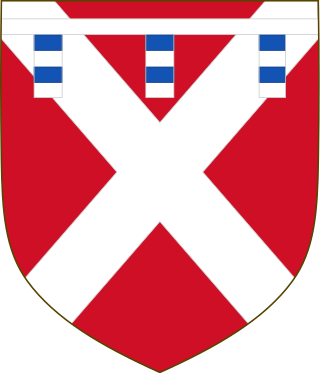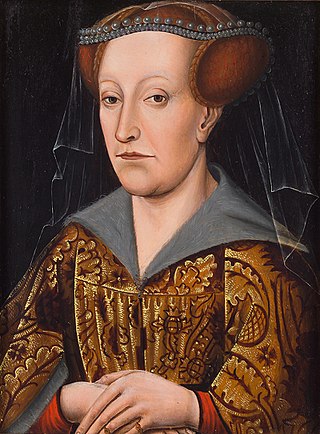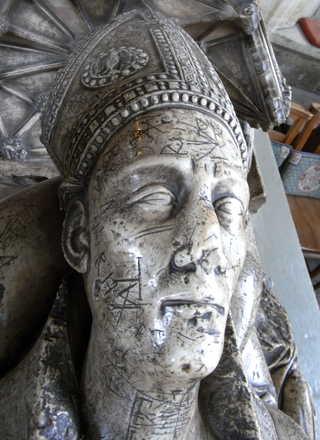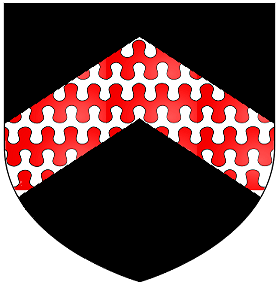
Sigismund of Luxembourg was Holy Roman Emperor from 1433 until his death in 1437. He was elected King of Germany in 1410, and was also King of Bohemia from 1419, as well as prince-elector of Brandenburg. As the husband of Mary, Queen of Hungary, he was also King of Hungary and Croatia from 1387. He was the last male member of the House of Luxembourg.

Richard Neville, 5th Earl of Salisbury KG PC was an English nobleman and magnate based in northern England who became a key supporter of the House of York during the early years of the Wars of the Roses. He was the father of Richard Neville, 16th Earl of Warwick, the "Kingmaker".

Jacqueline, of the House of Wittelsbach, was a noblewoman who ruled the counties of Holland, Zeeland and Hainaut in the Low Countries from 1417 to 1433. She was also Dauphine of France for a short time between 1415 and 1417 and Duchess of Gloucester in the 1420s, if her marriage to Humphrey, Duke of Gloucester, is accepted as valid.

Janusz I of Warsaw, also known as Janusz I the Old, was a Polish prince member of the House of Piast in the Masovian branch, from 1373/74 Duke of Warsaw and after the division of the paternal inheritance between him and his brother in 1381, ruler over Nur, Łomża, Liw, Ciechanów, Wyszogród and Zakroczym. In addition, he was a vassal of the Polish Kingdom since 1391 for the fief of Podlachia.

Walter Hungerford, 1st Baron Hungerford was an English knight and landowner, from 1400 to 1414 a Member of the House of Commons, of which he became Speaker, then was an Admiral and peer.

The city of Danzig (Gdańsk) was captured by the State of the Teutonic Order on 13 November 1308, resulting in a massacre of its inhabitants and marking the beginning of tensions between Poland and the Teutonic Order. Originally the knights moved into the fortress as an ally of Poland against the Margraviate of Brandenburg. However, after disputes over the control of the city between the Order and the King of Poland arose, the knights murdered a number of citizens within the city and took it as their own. Thus the event is also known as Gdańsk massacre or Gdańsk slaughter. Though in the past a matter of debate among historians, a consensus has been established that many people were murdered and a considerable part of the town was destroyed in the context of the takeover.

Edmund Stafford was Bishop of Exeter from 1395 to his death in 1419.
Sir Richard Redman was an English nobleman, knight, administrator and politician, being elected as a Member of Parliament representing Yorkshire and later acting as the Speaker of the House of Commons for the Parliament of 1415.

Koknese Castle is a complex in Koknese, Latvia, dating from the 13th century. The castle was situated on a high bluff overlooking the Daugava river valley. In 1965 a hydroelectric dam was built downriver, creating a reservoir that partially submerged the castle and flooded the surrounding valley.
Jan I of Żagań was a duke of Żagań-Głogów from 1397, from 1403 Duke of Żagań, Krosno Odrzańskie and Świebodzin and from 1412 sole ruler of Żagań and Przewóz.
The Treaties of Cölln and Mewe, concluded in 1454 and 1455, transferred the Neumark from the State of the Teutonic Order to the Electorate of Brandenburg. The Teutonic Knights had received the area as a pawn from Brandenburg in 1402, and as a possession in 1429. Financial shortages due to the onset of the Thirteen Years' War (1454–1466) forced Ludwig von Erlichshausen, Grand Master of the Teutonic Order, to pawn the Neumark to Frederick II, Elector of Brandenburg, by the Treaty of Cölln on 22 February 1454, and to subsequently sell it by the Treaty of Mewe on 16 September 1455.

Elisabeth of Bavaria-Landshut, nicknamed "Beautiful Beth", was an Electress of Brandenburg by marriage to Frederick I, Elector of Brandenburg. She acted as regent of Brandenburg during the absence of her spouse.

Sir John Stewart of Darnley, 1st Comte d'Évreux, 1st Seigneur de Concressault, 1st Seigneur d'Aubigny was a Scottish nobleman and famous military commander who served as Constable of the Scottish Army in France, supporting the French against the English during the Hundred Years War. He was a fourth cousin of King James I of Scotland, the third monarch of the House of Stewart.
Bernhard VI, Lord of Lippe was a German nobleman. He was the ruling Lord of Lippe from 1410 until his death. He was the son of Simon III and his wife, Irmgard of Hoya.
Ralph Mackerell was an English landowner and Member of Parliament.

Sir Richard Hankford (1397-1431) was an English landowner and soldier from Devon.

The House of Matsch, also written Maetsch, Mätsch, Metsch or Mazzo (Italian) is an old Swiss-Austrian noble family. Their origin is uncertain; they may have come from the Upper Valtellina from the village of Mazzo or may have been a sideline of the lords of Tarasp. The seats of the lords of Matsch were the castles of Obermatsch and Untermatsch in the Matscher Tal. Later they captured the Churburg at Schluderns in the Vinschgau (Venosta) valley and turned that into their main residence. For a time the lords of Matsch were one of the most powerful noble families in the Vinschgau and in present-day Graubünden.










